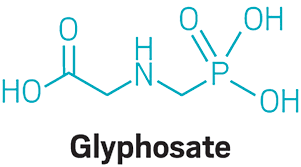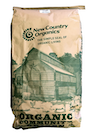
What You Need To Know About Glyphosate
In one year alone, up to 287 million pounds of glyphosate herbicides have been sprayed on crops in our country. The USDA allows up to 400ppm of this chemical compound in finished livestock feed—that’s more ppm than zinc, copper, cobalt, manganese, and selenium combined in most horse feeds. What impact does this have on the health of your horse? Let’s take a look.
In 1964, glyphosate was patented as a mineral chelator to remove mineral build-up (scaling) in boilers. As a mineral chelator, it binds with trace minerals to prevent scaling. Unfortunately, this binding action also makes trace minerals bio-unavailable to your horse. Trace minerals have critical jobs in your horse’s body that keep its bones, muscles, heart, and brain functioning properly.
In 2010, Monsanto patented glyphosate as an antibiotic. By using the same process that kills plants, glyphosate also kills bacteria, yeast, algae, and protozoa—all of which play important parts in your horse’s digestive system. Without these live microorganisms, the horse’s digestive system can weaken, and if your horse has a weak digestive system, its endocrine and immune systems can be at risk. A poorly functioning digestive system can also affect your horse’s mental state by creating a lack of focus or an increase in excitability. No gut, no horse.
There are still many unknowns about glyphosate. Some scientists are suggesting that glyphosate could be an analogue for glycine. Since it is a synthetic amino acid, it could replace glycine in the process of making collagen. Collagen is the main component of all connective tissues in your horse’s body. No glycine, no collagen, no horse.
As weeds have become more resistant to glyphosate, farmers have resorted to herbicide cocktails that combine glyphosate with other compounds like 2-4-D, dicamba, and glufosinate. The effect of these cocktails on your horse is unknown. Glyphosate-containing ingredients in your horse’s feed can include corn, soy, alfalfa, beet pulp, molasses, and distiller’s grains. Some ingredient grains are also sprayed directly with glyphosate as a desiccate for harvest; these can include oats, wheat, barley, peas, and sunflowers.
When you choose organic horse feed, you are saying no to glyphosate and choosing better gut health and nutrient bioavailability for your horse. New Country Organics horse feeds are free from antibiotics, harmful pesticides, and GMOs.


